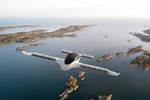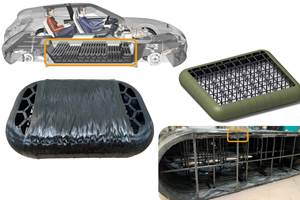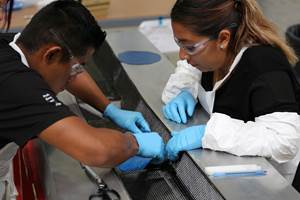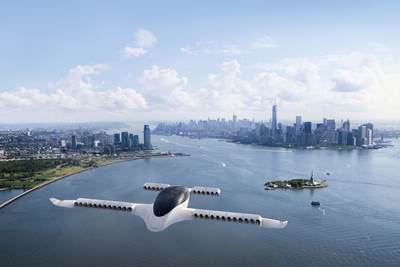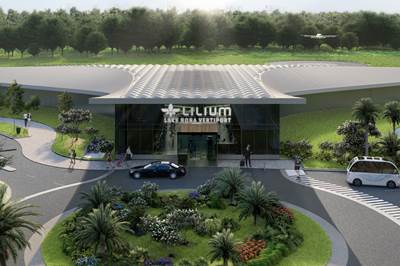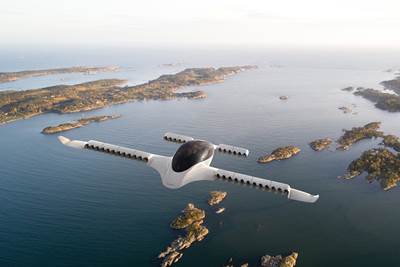Lilium announces seven-seater Lilium Jet, acquisition by Qell Acquisition Corp.
The new, larger eVTOL aircraft is slated to be the combined company Lilium’s first to go into serial production, by 2024.

Regional electric air mobility specialist Lilium GmbH (Munich, Germany) announced on March 30 that it has entered into a definitive business combination agreement with publicly listed acquisition company Qell Acquisition Corp. (San Francisco, Calif., U.S.). Upon closing of the transaction, the company will be called Lilium. Qell, led by former General Motors North America president Barry Engle, says it is focused on developing next-generation, sustainable mobility.
Also on March 30, Lilium revealed its seven-seater Lilium Jet (this is in addition to its carbon fiber composite-intensive, five-seater version that achieved its maiden flight in May 2019).
Seven-seater Lilium Jet
According to the company, its seven-seater regional shuttle service has market-leading capacity and will be the Lilium aircraft to enter serial production, which is targeted for 2024. The aircraft is said to be capable of quiet vertical take-off, allowing Lilium to access more landing sites and to built higher network density, avoiding the need for expensive ground infrastructure.
The new, larger Lilium Jet has a projected cruise speed of 175 mph at 10,000 feet and a range of 155+ miles, including reserves. The company says it is the culmination of five years of technology development across four generations of technology demonstrators, including Lilium’s full-scale five-seater.
Lilium applied for concurrent type certification for a high-capacity aircraft with EASA and the FAA in 2018. Development of the seven-seater Lilium Jet began in stealth mode following this milestone, and in 2020, it received CRI-A01 certification basis from EASA.
Lilium says it has successfully developed, tested and refined the underlying technology for electric vertical take-off and landing (eVTOL) jets — which the company calls Ducted Electric Vectored Thrust (DEVT) technology — along with key control systems, aircraft and battery architecture. Lilium claims its proprietary DEVT technology will enable it to scale to higher-capacity aircraft and keep noise emissions and ground footprint low.
The seven-seater Lilium Jet is said to have thirty times fewer components than a commercial airliner, and is designed for ease of manufacturability and scalability. Lilium says it applies automotive-style design for manufacturing methods, and is designing for fully-automated, high-quality production of its engines, actuators and batteries. Lilium’s supplier partners include Toray Industries (Tokyo, Japan), which provides the carbon fiber composites for the aircraft’s primary structures; Aciturri, manufacturing the fuselage and wing systems; and Lufthansa Aviation Training, training Lilium’s pilots.
Qell acquisition
The Boards of Directors of both Lilium and Qell have unanimously approved the proposed business combination, which is expected to be completed in the second quarter of 2021, subject to the approval by Qell's stockholders and the satisfaction or waiver of other customary closing conditions identified in the business combination agreement.
It is anticipated that ordinary shares for Lilium will be listed on the Nasdaq under the ticker symbol LILM.The transaction values the combined company at an implied $3.3 billion pro forma equity value The transaction values the combined company at an implied $3.3 billion pro forma equity value at the $10.00 per share PIPE price.
The combined company is expected to receive approximately $830 million of gross proceeds from a fully committed common stock PIPE offering of $450 million, along with approximately $380 million cash held in trust, assuming minimal redemptions of Qell’s existing public stockholders. The PIPE includes participation from leading strategic and long-term financial investors including Baillie Gifford, funds and accounts managed by BlackRock, Tencent, Ferrovial, LGT and its direct impact investing arm Lightrock, Palantir, Atomico, FII Institute and private funds affiliated with PIMCO.
Net cash from the transaction will be used to fund the commercial launch of Lilium’s seven-seater Jet. Lilium’s existing shareholders will roll 100% of their shares into the combined company. In addition, upon completion of the transaction, Lilium CEO Daniel Wiegand will hold 3:1 super voting shares.
The proceeds from the transaction are intended to fund the launch of commercial operations, planned for 2024. This includes the finalization of serial production facilities in Germany, launch of serial production aircraft and completion of type certification.
In addition, to date, Lilium reports that it has secured approximately $200 million of commitments from infrastructure partners, including Ferrovial and Tavistock Development Company. Up to 14 vertiports are already planned in Florida. Lilium is also in advanced discussions with key infrastructure partners for 10 vertiports to build a network across Europe.
Daniel Wiegand, co-founder and CEO of Lilium, says, “We’re incredibly excited to reveal the development of our seven-seater Lilium Jet and announce the next stage of our growth. … Our vision is to create a sustainable and accessible mode of high-speed travel and bring this to every community. ... We are pursuing our unique electric jet technology because it is the key to higher-capacity aircraft, with lower cost per seat mile while delivering low noise and low emissions. Today’s announcement brings us closer to launching our passenger service. In Qell, we have found a partner who shares our ambition for sustainable mobility and brings tremendous experience in running mobility and hardware businesses.”
Barry Engle, founder and CEO of Qell, says, “We are thrilled to be partnering with Lilium to together build the leader in regional electric air mobility. Qell set out to find an exceptional and ambitious technology company, with significant growth potential — and in Lilium we have found that. Lilium has unique technology and one of the most accomplished engineering and commercial teams in electric aviation. The seven-seater Lilium Jet is a game-changer for transportation. … I have spent my career in mobility and been part of the electrification of the automotive industry. The market and societal potential from the electrification of air travel is enormous. I, and the whole team at Qell, are excited for the impact Lilium can have and the part we can play.”
Related Content
McLaren celebrates 10 years of the McLaren P1 hybrid hypercar
Lightweight carbon fiber construction, Formula 1-inspired aerodynamics and high-performance hybrid powertrain technologies hallmark this hybrid vehicle, serve as a springboard for new race cars.
Read MoreCarbon fiber, bionic design achieve peak performance in race-ready production vehicle
Porsche worked with Action Composites to design and manufacture an innovative carbon fiber safety cage option to lightweight one of its series race vehicles, built in a one-shot compression molding process.
Read MoreTU Munich develops cuboidal conformable tanks using carbon fiber composites for increased hydrogen storage
Flat tank enabling standard platform for BEV and FCEV uses thermoplastic and thermoset composites, overwrapped skeleton design in pursuit of 25% more H2 storage.
Read MoreComposites manufacturing for general aviation aircraft
General aviation, certified and experimental, has increasingly embraced composites over the decades, a path further driven by leveraged innovation in materials and processes and the evolving AAM market.
Read MoreRead Next
Composite aerostructures in the emerging urban air mobility market
In the not too distant future, point-to-point, limited-distance, piloted and autonomous air travel for people and cargo will be the norm. Composites will make it possible.
Read MoreLilium announces first hub location for U.S. air mobility network
High-speed, electric air mobility will be launched by 2025 in Lake Nona, Orlando, Florida. Standardized vertiport designs suggest flexible assembly and incorporation into existing transport structures.
Read MoreLilium selects Aciturri for eVTOL fabrication
Spain-based Tier 1 aerospace manufacturer Aciturri will fabricate all composite and metallic structures for the piloted, four-passenger eVTOL Lilium Jet.
Read More
.jpg;width=70;height=70;mode=crop)


